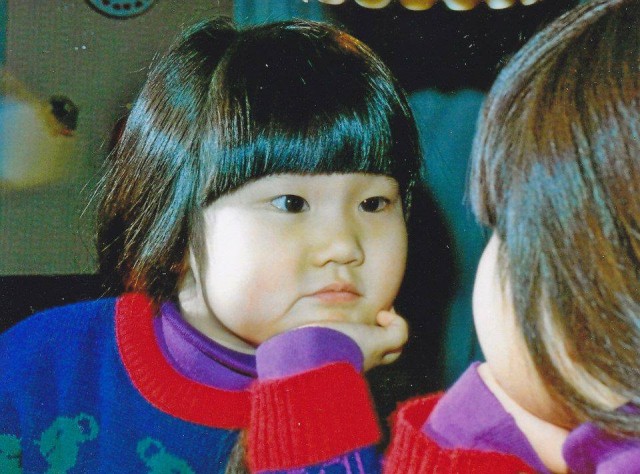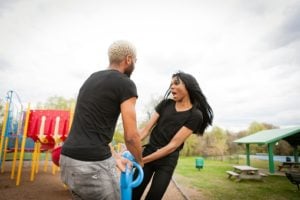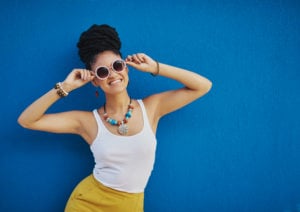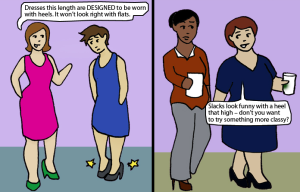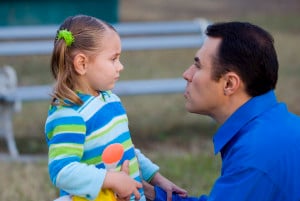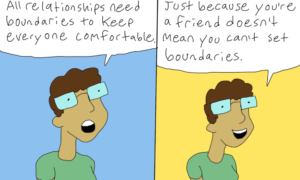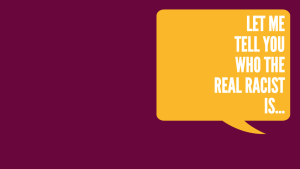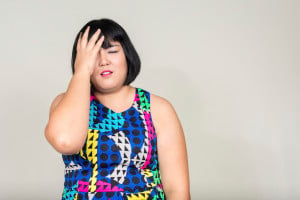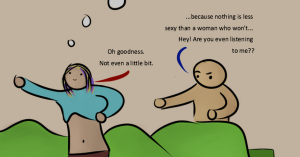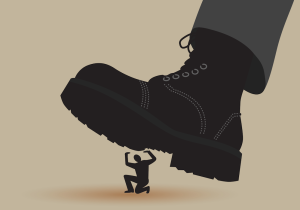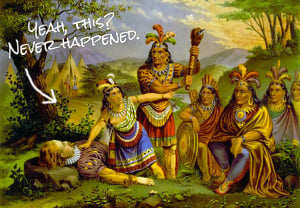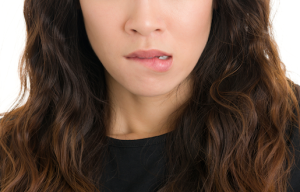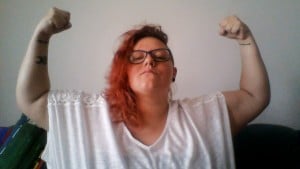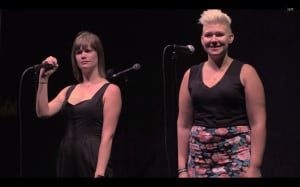Originally published on Autostraddle and republished here with their permission.
At 27, I came out as Korean-American.
I was always Korean, of course. I checked the “Asian” box when filling out a form. My ethnicity was written on my face in the shape of my eyes and my small flat nose.
But until a few years ago, it wasn’t an identity I felt connected to.
There were many identities that came first – poet, bisexual, queer, feminist, activist, organizer, fattie, vegan.
Being Korean was a fact, but not an identity.
I met my parents in 1984, on June 15, the day I arrived in the continental US on an airplane and was placed into my parents’ loving arms.
I was 17 months old, my thick hair clipped up in a messy topknot. My parents scooped me up and brought me home to the small, rural town in Western New York where I grew up. A few years later, we adopted my sister, who is three years younger than me.
My dad is Italian and my mom is Swedish-German. My sister and I were pretty much the only Asian kids in our school or neighborhood. We are immigrants, though we were both so young when we came to America that we don’t remember anything about Korea.
Before identifying as Korean-American, I strongly identified as “American” in a big-tent-melting-pot-kind-of-way.
From talking to other Korean adoptees, I’ve found this is a super common way for international adoptees to identify. When I was really little, I told classmates that I was 1/4 Italian, 1/4 Swedish, 1/4 German, 1/4 Korean, and 1/4 American.
I knew I was adopted, but I didn’t quite grasp how ethnicity worked… or math. I was, like, 5, okay?
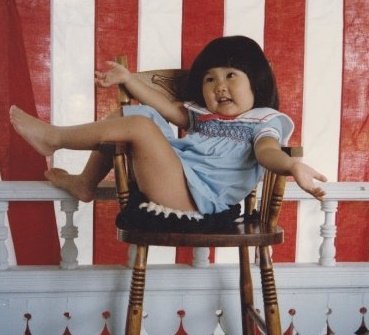
To some degree, I am all of those identities.
I know much more about Italian food than Korean food. I took German for eight years (and speak it very poorly). I was the only one in my family who preferred chopsticks when we went to the Chinese restaurant, which I taught myself how to hold from the instructions printed on the chopsticks wrapper sometime circa high school. I definitely picked up mannerisms and quirks from both my parents. People say I sound like my mom on the phone.
I had an awesome childhood. My parents were always there for me, and I knew I was both wanted and loved.
But being the only Korean kid for all my formative years had two effects: 1) I was made to learn how to stand up for myself and be strong in my convictions from a young age, and 2) I felt extremely disconnected from my race and ethnicity in ways I didn’t even understand until I was much older.
My peers were generally nice to me as a little kid, but some were jerks.
In kindergarten, during the first week of school, a white boy from another class made fun of me in the hallway, pulling the corners of his eyes back to imitate mine. I came home that day crying.
Being poked fun at for the shape of my eyes forced me to learn what it was to be “othered.” It was a hard lesson.
My parents had taught me that everyone is equal and deserves to be treated equally. Our home was mostly colorblind.
At five, I didn’t have a context for oppression. My parents always encouraged me to be proud and said there was nothing wrong with being different, something I thank them for (though they probably didn’t expect it to lead to my coming out as bi/queer twelve years down the road).
However, I didn’t understand until I was made fun of that looking different meant being treated differently. I didn’t understand that everyone is, in fact, not equal.
I can still tell you about every Asian in my high school, every black and Latina kid in my grade level. I had mostly white teachers, all white friends, all white crushes. I listened to the same music and wore the same clothes and had the same hobbies and celebrity idols as my white friends.
If I am honest with myself, I can say that I was more attracted to white people and that I used to think that Asian people were less pretty.
I thought I was less pretty.
On top of all that stuff that comes with puberty-time like low self-esteem and friend drama and crushing self-deprecation, I thought the reason I couldn’t get a boyfriend (a girlfriend was, like, not even in the realm of possibility for me at that time) was my eyes and my flat face.
Because Asian girls weren’t pretty.
I vividly remember laying on my bed in one of those classic teenage angst moments, crying because even if I lost weight or was popular, I couldn’t change the way my face looked. I couldn’t be attractive.
It wasn’t something I talked about with my friends — all of whom were white — because it was a deeply personal self-hate. I didn’t come to see this internalized racism for what it was until way later.
I actually convinced myself that I looked “less Asian” than other Asians, that my eyes were slightly more round. When I compared my face to the faces of Asian women in magazines (few though they were) and even to my sister, I was sure my eyes were slightly more white-looking.
I asked my high school friends if I looked less Asian to them. They said they didn’t see me as Asian or white, that I just looked like myself.
My friends and I played at colorblindness without realizing how loaded that was.
Maybe they sensed that I wanted to be told I looked a little white and played along.
Even today, when I look in the mirror, I don’t see myself as Korean. I logically know I look Korean and I wish I could see myself that way, but I’ve implanted this other version of what I look like in my brain.
Unlearning it is going to take a long time.
I have this sort of weird unofficial passing privilege in that I grew up in white spaces, with white people, identifying as kind-of-white, in a middle class American family in a small town.
I am often the only person of color in the room, but it isn’t uncomfortable to me because it’s my normal. I know how to “act white” because that’s just how I act.
In college, I joined the Asian Student Association for a bit. I felt way more out of place there than I ever had in an all-white space. I awkwardly tried to contribute and ended up becoming closest to the one white ally in the group.
I didn’t understand the cultural jokes and norms people talked about. I also just felt out of place physically. I was the only fat girl. I was the only feminist and the only queer. I just felt like I was taking up too much space — too loud, too big, too much.
I quit after one semester. I decided that I just wasn’t very Asian and that was okay.
Simultaneously, I was living into other identities that felt very authentic. I was the co-director of my campus Women’s Center. I was out as queer and friends with other queer and feminist people. I went vegetarian and then vegan. I was anti-war and pro-choice and anti-sweatshop and lots of other labels.
Claiming an identity was super important to me. I had t-shirts that had those identities printed on them in bold white letters.
But I didn’t identify as a person of color.
That was not, in my opinion at that time, my struggle. I was anti-racist, but I didn’t really think it applied to me as much as to other POC with, what I considered, more authentic oppression.
Years later, I was talking to another feminist Korean woman about this after a conference in NYC. We were on the subway, on the way to dinner. As I described my feelings about not strongly identifying as Asian, she listened quietly.
When I was done, she said, “But you are Korean. Your experience is the experience of a Korean person. Just because it’s not like my experience doesn’t mean it isn’t a valid Korean experience.”
Boom.
At the age of 27, I suddenly realized that being Korean didn’t have to mean having Korean parents and eating kimchi and knowing K-Pop artists. That I ever thought that suddenly felt really stupid.
We talked a lot at dinner that night and I came to realize that I had a lot in common with other Korean-Americans, both adoptees and those with biologically-related Korean parents.
In fact, there are so many Korean adoptees who grew up in American households with parents of a different ethnicity that there is a whole cultural/ethnic identity — KAD (Korean International Adoptee) — built for and around Korean adoptee experiences and culture.
By claiming a Korean identity, I let myself acknowledge that I’d faced oppression and racism. I realized that I identified with the collective “we” of American culture and history because I never had access to anything else.
The history we learn in public school is a white-washed, Euro-centric version. My ancestors did not descend from Europe, butt I’d bought that story, as many kids of color do.
Every makeup tutorial I’d ever read in Seventeen or Teen Cosmo or Sassy didn’t work on my monolids. I couldn’t find a foundation to match my not-pink-not-beige-not-brown skin tone.
I was affected by the lack of Asian representation on TV, in magazines, in the music industry. I have been told innumerable times by strangers that my sister and I look like twins when we couldn’t possibly look more different.
When I stand next to other Korean women of my approximate age, it is assumed we are sisters.
People just randomly speak to me in Korean or ask me to say things in Korean, forcing me to awkwardly tell them I only speak English (and very poor German).
I’ve had more than my fair share of people and partners who exoticize me, sexually or platonically.
At the end of the day, I still look in a mirror and can’t see myself fully, even though I’ve tried to unlearn my white-washing of my self. By escaping into my passing privilege, I erased my own identity.
Over the next four years, I started identifying strongly as Korean-American. After a quarter century of joking about being a Twinkie, yellow on the outside, white on the inside, and saying things like “Well, I’m not really Asian,” it felt like coming out all over again.
Everyone has always looked at me and thought of me as Asian, but I’ve only just recently started thinking of myself as such. Strangely, even with the drama and difficulty of coming out as bi/queer, it was harder for me, personally, to come out as Korean.
I used to be more comfortable in a room full of white people than a room full of POC. While I can still pass in an all-white crowd, I notice now if I’m the only POC. I am infinitely more comfortable in POC spaces, because I finally feel I belong there.
Actually, now I’m that person in POC spaces gently prodding for more diverse representation — especially of Asian, Pacific Islander, and Native American people.
My partner and I are talking about and planning to have a kid. In the next year, I hope to be knocked up. I never planned to have kids before and I definitely always thought I’d adopt (from Korea, but turns out that is not legal yet), so I hadn’t thought much about having biological children.
Once we made this decision, I was surprised to find that I had a lot of feelings about having a kid who looks like me. I have never, ever met anyone who looked like me. It is beyond what I can imagine. It kind of makes me freak out a little if I think about it too hard.
I also think about wanting to pass on some sense of a cultural heritage to my kid, who will be at least half Korean.
Honestly, I’m still learning about Korean culture myself, but I would like my future kid to have the option of accessing that cultural history. Maybe I’ll send them to Korea School, if I can find one that is not religiously affiliated.
I have had to come to terms with the fact that now that I have conceptualized a future kid who looks like me, I really want them in my life. It is so weird for me, wanting children at all, let alone biological children.
My partner, who will be the non-gestational parent, will not be biologically related to the future kid. I’m not biologically related to my parents or my sister. Biological relationships have never been important to me because my family is not about shared DNA.
Hell, if queer people know anything, it is that family is created through love, not blood.
I’m surprisingly and suddenly very excited about meeting this future person who will have bits of my very-Korean face.
I hope I can raise them to be tenacious and strong, as my parents raised me, and to help them understand that their very queer family story is a Korean-American experience, too.
[do_widget id=”text-101″]
KaeLyn Rich is a 32-year-old (femme)nist activist and the reigning Queer Fat Vegan Korean Immigrant Ms. America Pageant winner. She is a full-time community organizer and a part-time lover/sex educator. She lives in Rochester, NY with her partner-in-crime/spouse and their furkids: a xenophobic cat, two bossy bunnies, and a guinea pig. She and her partner blog about adding a human kid to the mix at Queer Family Matters. Talk sexy about intersectionality, cult movies, or theatre nerdiness to her at @kaelynrich. You can also check out her website here.
Search our 3000+ articles!
Read our articles about:
Our online racial justice training
Used by hundreds of universities, non-profits, and businesses.
Click to learn more
Most Read Articles
- « Previous
- 1
- …
- 30
- 31
- 32


